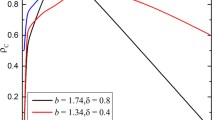Abstract
To model the cooperative behavior under the realistic world, we put forward a high-clustering network model with the property of adjustable power-law, and analyze the evolution of the prisoner dilemma game on this improved HK network model. Using simulation experiments, we investigate the effect of high clustering property of this network on the cooperative behavior. Extensive simulations indicate that a high value of the clustering coefficient may greatly contribute to the emergence of cooperative behavior. We also find that with the increase in the temptation parameter, the level of cooperation will decrease, but the variation range is not wide. Altogether, this evolutionary game model can promote the emergence of cooperative phenomenon by resisting the spread of the betrayal strategy.






Similar content being viewed by others
References
Barabási AL, Albert R, Jeong H (1999) Mean-field theory for scale-free random networks. Phys A Stat Mech Appl 272:173–187
Chen LQ, Gao JC, Xie G, Liu H.Y, L YA(2015) Routing to enhance traffic capacity for scale-free networks with tunable clustering. In: Advanced information technology, electronic and automation control conference. Chongqing, pp 110–113
Cui AX, Fu Y (2015) Accelerated-growth HK network evolution model. Comput Sci 42:37–39
Gómezgardeñes J, Campillo M, Floría LM, Moreno Y (2007) Dynamical organization of cooperation in complex topologies. Phys Rev Lett 98:108103
Holme P, Kim BJ (2001) Growing scale-free networks with tunable clustering. Phys Rev E Stat Nonlinear Soft Matter Phys 65:95–129
Huang ZG, Liu SL, Mao XP, Chen KF, Li J (2017) Insight of the protection for data security under selective opening attacks. Inf Sci 412–413:223–241
Li WG, Wang LH, Chen MF (2009) Study and improvement on growing HK network model. Comput Eng 35:121–122
Li PP, Ke JH, Lin ZQ, Hui PM (2012) Cooperative behavior in evolutionary snowdrift games with the unconditional imitation rule on regular lattices. Phys Rev E 85:287–300
Li J, Yan HY, Liu ZL, Chen XF, Huang XY, Wong DS (2015a) Location-sharing systems with enhanced privacy. IEEE Syst J Mob Online Soc Netw 11:1–10
Li RQ, Sun SW, Ma YL, Wang L, Xia CY (2015b) Effect of clustering on attack vulnerability of interdependent scale-free networks. Chaos Solitons Fractals 80:109–116
Li P, Li J, Huang Z, Li T, Gao CZ, Yiu SM, Chen K (2017a) Multi-key privacy-preserving deep learning in cloud computing. Future Gen Comput Syst 74:76–85
Li P, Li J, Huang Z, Gao CZ, Chen WB, Chen K (2017b) Privacy-preserving outsourced classification in cloud computing. Clust Comput 1–10
Luo C, Zhang XL, Liu H, Shao R (2016) Cooperation in memory-based prisoner’s dilemma game on interdependent networks. Phys A Stat Mech Appl 450:560–569
Meng XK, Sun SW, Li XX, Wang L, Xia CY, Sun JQ (2016) Interdependency enriches the spatial reciprocity in prisoner’s dilemma game on weighted networks. Phys A Stat Mech Appl 441:388–396
Nowak MA, May RM (1992) Evolutionary games and spatial chaos. Nature 359:826–829
Santos FC, Pacheco JM (2005) Scale-free networks provide a unifying framework for the emergence of cooperation. Phys Rev Lett 95:098104
Song YP, Ni J (2016) Effect of variable network clustering on the accuracy of node centrality. Acta Phys Sin 65:375–382
Watts DJ, Strogatz SH (1998) Collective dynamics of ‘small-world’networks. Nature 393:440–442
Xu YZ, Zhang DM, Zeng C, Sun YQ (2016) Research on and modeling of the improved HK network model. Electron Sci Tech 29:106–109
Zhang XJ, G B, Guan XM, Zhu YB, Lv RL (2016) Cascading failure in scale-free networks with tunable clustering. Int J Mod Phys C 27:1650093–1650093
Author information
Authors and Affiliations
Corresponding author
Ethics declarations
Conflict of interest
The authors declare that they have no conflict of interest.
Ethical standard
This article does not contain any studies with human participants performed by any of the authors.
Additional information
Communicated by A. Di Nola.
Project supported by the National Natural Science Foundation of China (Grants Nos. 61673200, 61502218 and 61472172) and by the Natural Science Foundation of Shandong Province of China (Grant No. BS2014DX016).
Rights and permissions
About this article
Cite this article
Deng, Y., Miao, P. & Yang, H. Cooperation of improved HK networks based on prisoner dilemma game. Soft Comput 22, 7893–7899 (2018). https://doi.org/10.1007/s00500-018-3055-7
Published:
Issue Date:
DOI: https://doi.org/10.1007/s00500-018-3055-7




